Disease: Understanding the Basics
Introduction to Disease
Disease is a condition that impairs the normal functioning of the body. It can be caused by various factors including pathogens such as bacteria, viruses, fungi, and parasites, as well as genetic, environmental, and lifestyle factors.
Types of Diseases
There are different types of diseases, including:
- Infectious Diseases: Caused by pathogenic microorganisms that can be transmitted from one person to another.
- Chronic Diseases: Long-lasting conditions that can be managed but not always cured, such as diabetes, heart disease, and cancer.
- Autoimmune Diseases: Conditions in which the immune system mistakenly attacks the body's own cells.
- Genetic Diseases: Result from abnormalities in an individual's genetic makeup.
Causes of Diseases
Diseases can be caused by a variety of factors, including:
- Pathogens: Microorganisms that cause infectious diseases.
- Genetics: Inherited genetic mutations that can lead to genetic diseases.
- Environmental Factors: Exposure to pollutants, radiation, and other environmental hazards.
- Lifestyle Choices: Unhealthy behaviors such as smoking, poor diet, and lack of physical activity.
Prevention and Treatment
Preventing and treating diseases often involves:
- Vaccination: Immunization to prevent infectious diseases.
- Healthy Lifestyle: Maintaining a balanced diet, regular exercise, and avoiding harmful substances.
- Medical Treatment: Diagnosis, medication, and surgical interventions for managing and curing diseases.
- Public Health Measures: Policies and interventions to control and prevent the spread of diseases in communities.
Study Guide
- What is a disease?
- List and describe the different types of diseases.
- What are the causes of diseases?
- How can diseases be prevented and treated?
- Discuss the importance of vaccination and healthy lifestyle choices in disease prevention.
Understanding the basics of disease is crucial for maintaining good health and well-being. By studying the causes, types, and prevention of diseases, we can make informed decisions to protect ourselves and others from potential health risks.
.◂Science Worksheets and Study Guides Fourth Grade. Cells- The building blocks of living things
Study Guide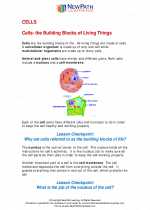 Cells- The building blocks of living things
Cells- The building blocks of living things  Activity Lesson
Activity Lesson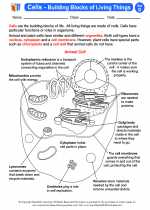 Cells - Building Blocks of Living Things
Cells - Building Blocks of Living Things  Worksheet/Answer key
Worksheet/Answer key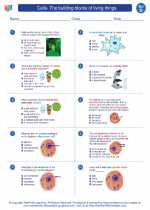 Cells- The building blocks of living things
Cells- The building blocks of living things  Worksheet/Answer key
Worksheet/Answer key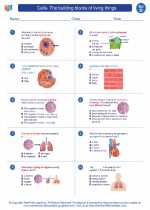 Cells- The building blocks of living things
Cells- The building blocks of living things  Worksheet/Answer key
Worksheet/Answer key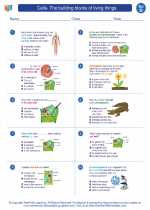 Cells- The building blocks of living things
Cells- The building blocks of living things  Worksheet/Answer key
Worksheet/Answer key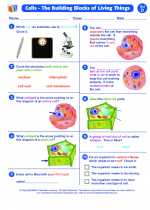 Cells - The Building Blocks of Living Things
Cells - The Building Blocks of Living Things  Worksheet/Answer key
Worksheet/Answer key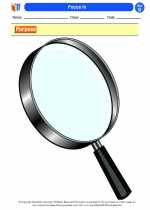 Focus In
Focus In  Vocabulary/Answer key
Vocabulary/Answer key Cells- The building blocks of living things
Cells- The building blocks of living things  Vocabulary/Answer key
Vocabulary/Answer key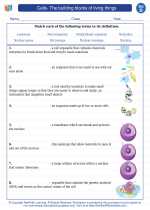 Cells- The building blocks of living things
Cells- The building blocks of living things  Vocabulary/Answer key
Vocabulary/Answer key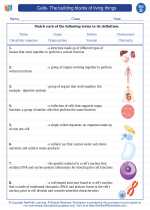 Cells- The building blocks of living things
Cells- The building blocks of living things 

 Activity Lesson
Activity Lesson
 Worksheet/Answer key
Worksheet/Answer key
 Worksheet/Answer key
Worksheet/Answer key
 Worksheet/Answer key
Worksheet/Answer key
 Worksheet/Answer key
Worksheet/Answer key
 Worksheet/Answer key
Worksheet/Answer key
 Vocabulary/Answer key
Vocabulary/Answer key
 Vocabulary/Answer key
Vocabulary/Answer key
 Vocabulary/Answer key
Vocabulary/Answer key

The resources above cover the following skills:
The Living Environment: Students understand that cells are the basic unit of life, that all life as we know it has evolved through genetic transfer and natural selection to create a great diversity of organisms, and that these organisms create interdependent webs through which matter and energy flow. Students understand similarities and differences between humans and other organisms and the interconnections of these interdependent webs.
Cells: Students describe how living things are made up of one or more cells and the ways cells help organisms meet their basic needs.
Give examples of organisms that consist of a single cell and organisms that are made of a collection of cells.